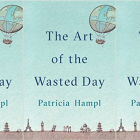The Suburban Microcosms of The Hundred Waters

The Hundred Waters
Lauren Acampora
Grove | August 23, 2022
Louisa is bored. She lives in a glass house in her old hometown of Nearwater, CT, with her husband, Richard, and her daughter, Sylvie. Richard is an architect. Sylvie is emotionally stunted. Louisa used to live in New York City, NY. She used to date a handsome but emotionally unavailable artist named Xavier who’d told her that her photography was exciting and provocative. But what had all that amounted to? Now, Louisa is the director of the town’s art center. She hasn’t had a show in years. Louisa, like many other artists, has made the choice, consciously or otherwise, to prioritize starting a family rather than actively participating in the New York City art world. Still, she can’t quite kick the old scene. More ominously, a young provocateur has arrived in Nearwater that threatens to rupture not only the local art community but Louisa’s family as well.
There were times as I read Lauren Acampora’s new novel, The Hundred Waters, that I wondered if Louisa actually had any artistic talent at all. She’s stuffy and anxious about the way she appears to others. She seems to aim her camera mechanically and dispassionately. In fact, her entire being seems to embody the stagnancy of the suburbs that Acampora casts a cinematic gaze on throughout the book. Her environment is very much constructed, and maybe she likes that. After all, as she says of her own work, she’s always been drawn to microcosms—of which there is no short supply in Nearwater. There’s the perfectly manicured golf club and the perfectly placid art center, as well as the zoo owned as a side project of a local oil exec, and the school’s athletic complex, built above toxic municipal waste—each of these perfectly zoned, like the swimming pools John Cheever’s drunk narrator once attempted to swim across.
As Louisa and her husband raise their daughter within the microcosm of Nearwater, Sylvie becomes more and more distant. She’s still reeling after the loss of a former classmate to cancer—a girl she rode horses with but otherwise doesn’t actually remember being very close to. The death isn’t just a personal loss for Sylvie—it’s a harbinger of a gradually declining environment, an ecological and social illness, rather than just a physical one. In this way, Sylvie is unlike her mother, whose concerns center largely on herself. She is also both younger and more precocious than Louisa was when she left Nearwater for the big city. But, in other ways, Sylvie is her mother’s parallel, and it’s the similarities Louisa sees between herself and her daughter that frighten her. Like her mother, Sylvie is unsettled by Nearwater and enamored with and propelled by the wiles of a young man whose art is gaining notice.
These personalities in The Hundred Waters are readily recognizable—the bored quasi-housewife, the awkward daughter, the emotionally unavailable husband, the provocative young man. At the start of the novel, it’s easy to assume that there won’t be much drawing me to them, convincing me they’re worthy of my sympathy. Acampora’s feat, however, is to force us to reconsider their roles. In The Hundred Waters, the nuclear family truly has nuclear potential, and that potential is energized by the secrets each family member keeps. In this way, Acampora allows us to rethink who holds power in a family—or in a community, or society. Her distant but detailed appraisal of her characters makes us consider the suburbs worthy of our attention once again. Perhaps these towns are not just sleepy places where people escape the social and professional pressures of big cities. Perhaps, instead, they are the headquarters from which silent puppets control the way we see the world. The Hundred Waters is a fast read that moves ever faster the deeper Louisa and Sylvie head down their suburban rabbit hole. When I reached the novel’s haunting conclusion, I got the eerie sense I hadn’t taken a breath in a long while.



